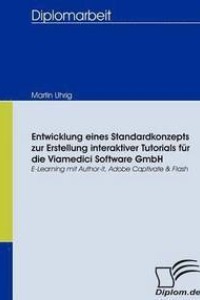
Liknande böcker
Virtuelle Anatomie Mit Der Unity Engine. Entwicklung Und Evaluationsentwurf Eines Vr-Simulators Zur Implantation Einer Endoprothese Des H ftgelenks
Bok av Patrick Wiechert
Bachelorarbeit aus dem Jahr 2016 im Fachbereich Informatik - Angewandte Informatik, Note: 2,0, Technische Universität Chemnitz (Maschienenbau - Prozessinformatik und Virtuelle Produktentwicklung), Sprache: Deutsch, Abstract: Für die Entwicklung eines Virtual Reality Simulators (VR-Simulator) zur Implantation einer Endoprothese des Hüftgelenks wird die Game-Engine Unity getestet. Dazu werden im ersten Teil der Arbeit die Implementierung eines 3D-Modells und die Simulationen des Blutes, Gewebes und Materialabtrages der Knochen in Unity untersucht. In den Versuchen wurde ein 3D-Modell der Hüfte modelliert und verschiedene Plugins zur Ausführung der Simulationen getestet. Während die Implementierung des 3D-Modells und die Simulation des Blutes lediglich geringe Mängel aufwiesen, wurden die Simulationen des Gewebes und des Materialabtrags den Anforderungen nicht gerecht. Dennoch ist eine Entwicklung des VR-Simulators in Unity vorstellbar. Im zweiten Teil der Arbeit wird eine Evaluierungsstudie zur Feststellung des Lernerfolges und der Qualität eines VR-Trainingssimulators für Hüftoperationen geplant. Diese sollen mittels Fragebögen durch die Prädiktoren Immersion, Presence und Nutzererfahrung erfasst werden und durch die Analyse von Interaktionen mit Nutzervariablen unterschiedliche Nutzergruppen identifizieren.In order to develop a virtual reality simulator (VR simulator) for implantation of an endoprosthesis of the hip joint, the game engine Unity is tested. Therefore, the implementation of a 3D model and the simulations of the blood, tissue and material removal of bone in Unity are examined. In the experiments, a 3D model of the hip was modeled as well as tested and different plugins for the performance of the simulation were tested, too. Concerning the implementation of the 3D model and the simulation of the blood merely minor defects were detected. On the other hand, the simulation of the tissue and the material removal of the bones did not meet requirements. Nevertheless, a development of the VR simulator in Unity is conceivable. In the second part, an evaluation study to determine the learning success and the quality of a VR training simulator for the insertion of endoprosthesis of the hip is planned. These are to be detected by means of questionnaires by the use of the predictors immersion, presence and user experience and different user groups are to be identified by analyzing interactions with user variables.







